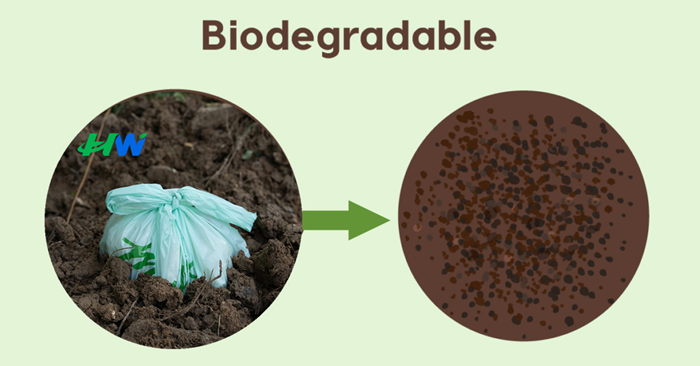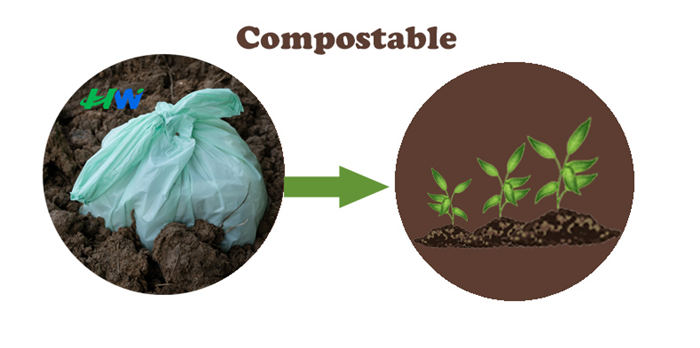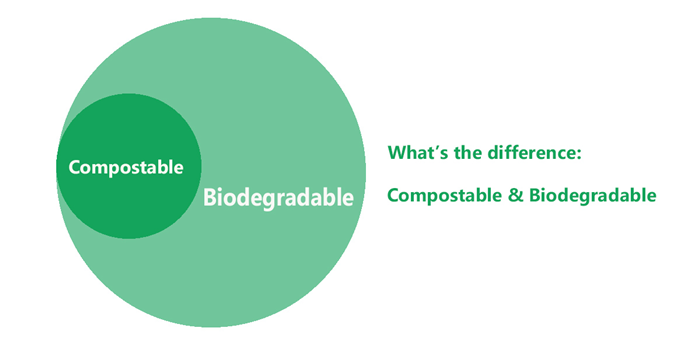
Biodegradable (a substance or object) is capable of being decomposed by bacteria or other living organisms and thereby avoiding pollution. Traditional plastics will not degrade for 400 years and will cause significant global pollution. Nowadays, the term “ Biodegradable” is commonly used for environmentally friendly products, indicating that the product can be decomposed by microorganisms and returned to nature.
To biodegrade, organic materials require air, water, light, or a combination of these elements so microorganisms can do their job. Remove any or all of these elements, and biodegradation can be slowed dramatically. In order for packaging products or materials to qualify as biodegradable, they must completely break down and decompose into natural elements within a short time after disposal – typically a year or less.
Waste materials that can be broken down into simpler, non-toxic substances by microorganisms are called biodegradable substances. Examples: animal waste, waste from vegetables, cattle dung, etc.

Compostable is used to describe a product that can disintegrate into non-toxic, natural elements. It also does so at a rate consistent with similar organic materials. Compostable products require microorganisms, humidity, and heat to yield a finished compost product (CO2, water, inorganic compounds, and biomass). Compostable products add value to the planet's ecosystem by decomposing into nutrient-rich compost.
Degradation time: 90% of compostable products degrade in a time period of 180 days specifically in a compost environment. Benefits over biodegradable plastics: Compostable products use less water. Require less energy, and generate fewer greenhouse gas emissions during the manufacturing process.
Products marked as compostable must be tested to comply with American industrial composting standards ASTM D6400 and ASTM D6868. These standards require compostable products to be biodegradable within 180 days without leaving harmful residues. The testing includes seed germination tests to ensure that the resulting compost is not harmful to plant life.
Types of compost: industrial compost and household compost
Industrial composting can more strictly maintain the temperature and stability of compost. At the simplest level, household composting generates nutrient-rich soil due to the decomposition of organic waste such as food residues, grass shavings, leaves, and tea bags.
The main difference between home compostable packaging and compostable packaging is its ability to decompose at different temperatures. The industry standard for composting in the UK is EN 13432. It points out that home compostable packaging must be able to 'decompose' at temperatures of 20-30 ° C.
Being biodegradable does not mean that it is also compostable.
All compostable products are biodegradable, but not all biodegradable products are compostable.

Plastic that is compostable is biodegradable, but not every plastic that is biodegradable is compostable. Whereas biodegradable plastic may be engineered to biodegrade in soil or water, compostable plastic refers to biodegradation into soil conditioning material (i.e., compost) under a certain set of conditions.
Compostable products have undergone rigorous testing to ensure that they decompose within a specific time frame and do not release any harmful substances into the environment. Biodegradable products do not have such requirements, which means they may not be as beneficial as initially appeared.
Compostable materials provide the cleanest form of biodegradation due to the controllability of the environment - high oxygen levels and a large number of available bacteria. These conditions ensure effective physical and chemical decomposition to produce the least harmful by-products to the earth. Compostable products have undergone rigorous testing to ensure that they decompose within a specific time frame and do not release any harmful substances into the environment.
The design purpose of compostable materials is to decompose to produce nutrient-rich biomass. The biodegradation process does not produce harmful pollutants and toxins, which means that the material is designed to safely return to the environment. Biodegradable materials can decompose through natural processes in the environment but may pose a threat to the environment.
